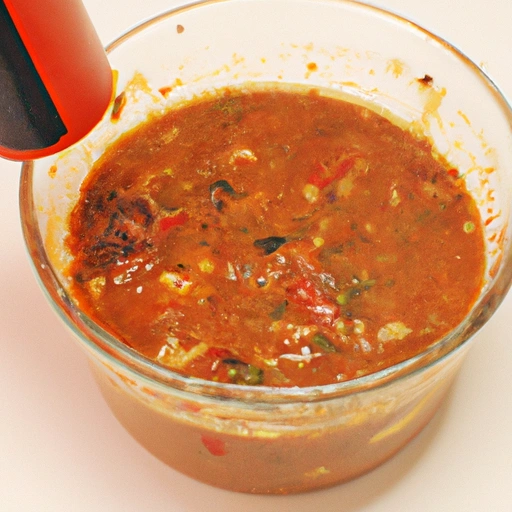Enchilada Sauce
Description

Enchilada sauce is a rich, spicy, and flavorful condiment that originates from Mexico. This savory sauce is typically made from chili peppers, tomatoes, garlic, onions, and a blend of spices, including cumin, oregano, and sometimes chocolate or cinnamon for added depth. It is a staple in Mexican cuisine and is known for its distinctive red or green color, depending on the type of chilies used.
Given its international popularity, enchilada sauce is often modified with various ingredients to suit different palates, while still maintaining its authentic taste. It is available in both canned and homemade versions, with the latter allowing for more control over the level of spice and texture.
Measurements for ingredients in enchilada sauce recipes can be found in both metric (grams, milliliters) and imperial (ounces, cups) units, accommodating cooks from across the globe.
Common uses
Enchilada sauce is most commonly used as a key component in making enchiladas, where it is poured over rolled tortillas that are stuffed with various fillings such as meat, cheese, beans, or vegetables. The sauce-soaked tortillas are then baked to perfection. However, its use extends beyond enchiladas, serving as a flavorful base or topping for other Mexican dishes such as chilaquiles, tamales, and burritos.
Nutritional value
Calories
A typical serving of enchilada sauce (about 1/4 cup or 60 ml) contains approximately 20-30 calories, making it a low-calorie addition to dishes when used in moderation.
Protein
Enchilada sauce is not a significant source of protein, containing less than 1 gram per serving.
Fat
The fat content in enchilada sauce is generally low, with most recipes containing less than 1 gram of fat per serving, unless additional fat is added during preparation.
Carbohydrates
Most of the carbohydrates in enchilada sauce come from the tomatoes and onions, with a typical serving containing about 3-5 grams of carbohydrates.
Vitamins
Enchilada sauce contains a variety of vitamins, particularly vitamin C from tomatoes and vitamin A from chili peppers.
Minerals
It also provides minerals such as potassium and iron, which are naturally present in its primary ingredients.
Health benefits
Enchilada sauce can contribute to a healthy diet when consumed in moderation. The capsaicin found in chili peppers has been studied for its potential to boost metabolism and promote fat burning, while the tomatoes provide antioxidants such as lycopene, which has been linked to reduced risk of heart disease and cancer.
Potential risks
Some store-bought enchilada sauces may contain high levels of sodium and preservatives, which could pose health risks if consumed in excess. Homemade enchilada sauce can be a healthier alternative as it allows for control over the amount of salt and the quality of ingredients used.
Common recipes
Enchilada sauce is primarily used in the preparation of enchiladas, but it is also a staple in other Mexican dishes such as tacos, nachos, and Mexican lasagna.
Cooking methods
Enchilada sauce can be used as a simmering sauce for meats and vegetables, as a marinade, or as a flavorful addition to soups and stews.
Pairing with other ingredients
The sauce pairs well with a variety of foods including poultry, pork, beef, seafood, rice, and beans. It also complements cheeses, particularly those that melt well such as cheddar, Monterey Jack, and queso fresco.
Summary
Enchilada sauce is a versatile and flavorful ingredient that adds depth and authenticity to a wide range of dishes. Its combination of chili peppers, tomatoes, and spices creates a robust flavor that can be tailored to suit any palate. Whether used in traditional Mexican cooking or as an adventurous addition to other cuisines, enchilada sauce brings a taste of Mexico to kitchens around the world. Remember to consider the nutritional aspects and potential risks when selecting or preparing this delicious sauce.